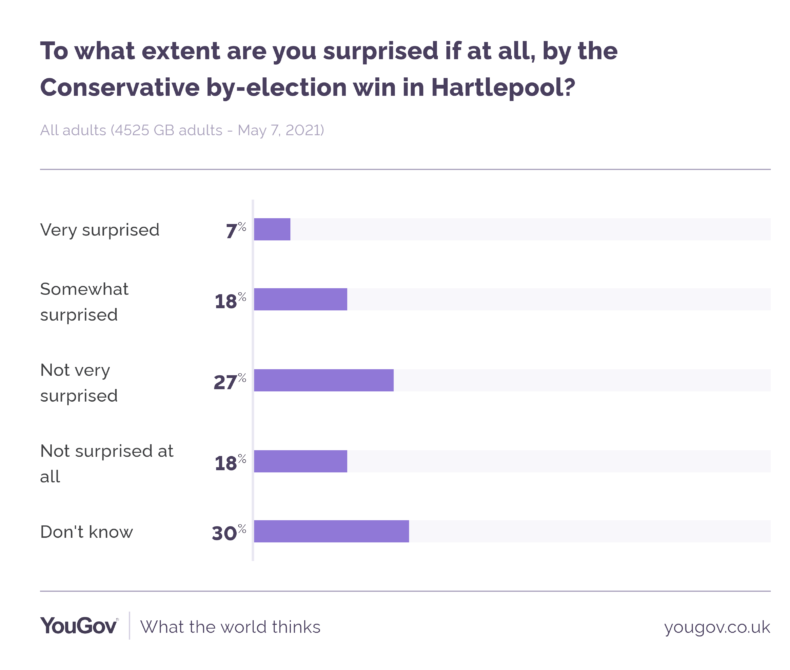Hartlepool: two factors neglected in the analysis so far

Two important factors are being neglected in the instant political analysis of the Conservative victory in the Hartlepool by-election.
First, it’s not a story of something new happening. Rather, it’s retelling of a story we’ve already had.
The fact of Hartlepool having a Conservative MP is dramatic. But it’s not surprising or telling us anything new. Rather, the Conservative victory in the by-election is the final act of the 2019 general election. The Conservatives won plenty of similar seats at that contest. It was only the quirk of an unusually strong performance by the Brexit Party that meant the Conservatives didn’t win it last time.
The by-election has simply seen Hartlepool’s politics catch up with elsewhere. As YouGov polling shows, the public has been rather wiser than some commentators in not being surprised by the result.
Second, there’s the important first opinion poll that Survation carried out in the seat. Their final poll, showing a big Conservative lead, attracted a lot of scepticism but was right. However, it is their first poll for the by-election that is important for understanding what happened.
Combined, Conservatives and Brexit Party got 55% in 2019. Survation’s first poll put the Conservatives on 49%. Their second and final one put the party on 50% and the result saw the Conservatives secure 52%. No great drama there. But for Labour it was 38% in 2019, 42% in the first poll and then… 33% in the second poll followed by 29% in the actual result.
The story here is of Labour failure, not of Conservative surge. That’s a point reinforced by the English local elections. At 36%, the Conservative equivalent national vote share is decent but not stellar. That’s not some new era-defining level of support for Boris Johnson’s party. It’s a fragile result that has brought success this time but could very plausibly be followed by failure.
It looks like Labour badly messed up its candidate selection and campaign. Picking a candidate from elsewhere but who had been closely involved in a controversial decision to axe services at the local hospital was a deadly combination. (Given how Labour won the previous Hartlepool by-election with hospital promises it then broke, it was perhaps appropriate that the hospital would be part of Labour’s undoing this time.) I suspect that once more detailed analysis is in, this will turn out to have mattered rather more than the Labour candidate being a previous Remainer who lost his seat in 2019.
The lesson is that the Hartlepool result is both better and worse for Labour than it appears from the stories wrongly covering it as if it was a dramatic new political revelation.
Better for Labour in that this diagnosis puts the immediate cure very much in Labour’s own hands. Labour needs to sort out candidate selections and run better campaigns in the weeks before polling days.
But worse for Labour in that it also shows that the simple act of changing party leader from Jeremy Corbyn to Keir Starmer has not been enough to revive Labour. Saying Hartlepool is just the final act of the 2019 election means it doesn’t show a dramatic turn for the worse. It also means the result shows Labour isn’t yet recovering.As with the Liberal Democrat exiting coalition in 2015, Labour changing leader in 2020 is not sufficient to revive the party’s fortunes. The party needs much more change than that. That’s been an ongoing lesson for the Lib Dems, which I’ve written about and worked for consistently. It is one that applies to Labour too.
For Labour, the immediate question is: having seen the electoral disasters Jeremy Corbyn led the party to in all three types of elections in 2019, is it willing to take change further than just its leader?
More on those Lib Dem lessons once all the results are in and there’s more to digest. For the latest on the results see my rolling post.
Sign up to get the latest news and analysis
"*" indicates required fields
These Red wall cities were beaten to submission, poverty, lack of jobs and lack of hope from Labour, who are still divided by issues unrelated to northern cities, and it is natural for the Hartlepool voters to turn to the possible help provider , the Government.
It will continue to be like that, unless Labour will show a real alternative to the conservatives.
Many people don’t vote rationally for parties who might try to meet their needs. Some vote for well known characters they find charismatic, eg Hitler, Trump, Lloyd George, Johnson, Farage, Salmond, Blair and maybe Thatcher and this may be enough to tip the balance. Nick Clegg wasn’t bad in this respect. Now then, who’ve we got?
Hi Mark, there’s a typo halfway through “.. simple act of changing party leader from Keir Starmer to Jeremy Corbyn”
Oops! Thanks for mentioning.
The government has been caring to furlough many with billions of what will be paid by well paid taxpayers; not the average 30K or less guys of Northern Cities. Thats a great sweetener, without considering rail infrastructure improvements. The Tories are pragmatic, unlike all other parties in the UK.